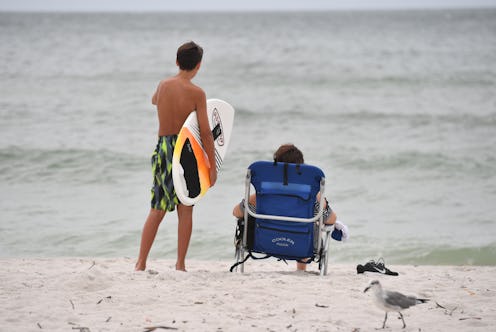
With the projected path of Hurricane Irma in constant flux, residents who have evacuated, as well as those who have chosen to stay in shelters or at home, might be wondering: Will Hurricane Irma hit Melbourne, Florida? The city of Melbourne's website noted that they are still expecting to be impacted by Hurricane Irma, and all residents who have evacuated should wait for an all clear message from emergency officials before returning home.
Additionally, residents of Melbourne Beach are under a curfew that prohibits people or vehicles from moving about town streets or sidewalks from midnight Saturday to 7 a.m. Sunday, then from 7:30 p.m. Sunday to 7 a.m. Monday, local newspaper Florida Today reported. With the hurricane's path now projected to cause more damage on Florida's west coast, the paper also noted that officials are alarmed that people are trying to return to Brevard County on Florida's east coast where both the city of Melbourne and the town of Melbourne Beach are located.
As reported by Florida Today, Brevard County Communications Director Don Walker urged people to reconsider:
It's still going to be a dangerous situation. Don't make a dumb decision. Stay put until the all-clear is issued by emergency officials. This thing has had people zigging and zagging all week long. It's got a lot of people second-guessing themselves. And it can still shift left or right.
Those who try to return could be putting themselves in more danger, and the risk from storm surges is still a reality.
All Areas Of Florida At Risk From Irma
The Washington Post reported that it's still not clear where exactly Irma will make landfall in Florida, but the state's western coast is now a likely target. However, that doesn't mean residents on the eastern coast are in the clear — if the storm reaches its full potential, it could be one of the worst hurricanes in the Florida's history. Should Irma stay on her current path, Melbourne and Melbourne Beach could still experience storm surges of up to 4 feet.
As of 5 p.m. on Saturday, Sept. 9, Irma was positioned about 115 miles southeast of Key West, moving west-northwest at 9 mph, the Post reported. Late Saturday, the storm is predicted to turn north, passing over the Keys and then up the west coast. But slight shifts in this projected track were still possible.
With the shift of course and intensity during the past 24 hours, it's clear that aside from being monstrous in size, Irma is also highly unpredictable. The Florida peninsula, and even the panhandle, are likely to witness damaging winds despite no longer being in the projected path of the dangerous eyewall. The National Hurricane Center warned the storm would bring "life-threatening wind impacts to much of the state."
Irma's Current Forecast For Melbourne
Currently, Melbourne is expected to experience tropical storm conditions — with the possibility of hurricane conditions — beginning Sunday, and possibly extending through Monday. Brevard County is still under a hurricane warning, a storm surge warning, and a flood watch until further notice, according to the National Weather Service.
The large hurricane wind field of Irma will produce far-reaching effects regardless of where the exact center moves. Hurricane force wind gusts will remain a significant concern and will have the potential for widespread damage along and to the east of Irma's track.
Additionally, Irma could bring up to 16 inches of rain, and spawn tornadoes as it travels up Florida. The NWS advised that all residents check-in with their emergency points of contact before the storm hits, and be ready for tornados.
If a tornado warning is issued for your area, be ready to shelter quickly, preferably away from windows in an interior room on the lowest floor. If driving, scan the roadside for quick shelter options. Have a way to receive tornado warnings whether on the road or in a shelter.
All Florida residents should have a disaster kit with food, water, medications, etc. for several days. Follow the NWS for updates in your area.